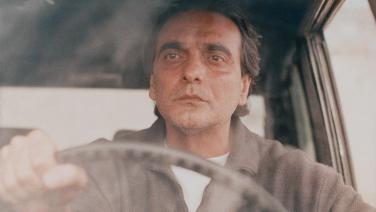
Taste of Cherry, Abbas Kiarostami, Iran, 1997, 98’, OV with Basque subtitles
It’s a year this summer since the death of the Maestro Abbas Kiarostami. It’s difficult to refer to Kiarostami without calling him Maestro, probably because he invented a new way of looking at and creating images.
Vehicles, understood as an intimate space, are of key importance in his work and there’s no doubt that most of his films can be considered road movies. Although it would be by no means amiss to include those films in which ground is also covered on foot, like The Traveller (1974), or Where is the Friend's Home, (1982). Kiarostami is interested in roaming as an incessant search, and there is in that search a spiritual dimension that is manifested in the simplest things. Taste of Cherry, which took the Palme d’Or in 1997, offers a very clear proposal; crystal clear. A man wishes to take his life and needs to find someone to help him do it. He needs an accomplice for his own suicide. All the people he talks to about it refuse, are even horrified. From their reactions is gleaned a strangely unexpected desire to cling to life, in contrast to our anti-hero Badii’s desire to put an end to the pain that is life, enveloping the film in a veil of deep grimness and transcendence. Taste of Cherry is a film that is largely spoken, and the formal detachment with which Kiarostami films those almost meditational conversations, applying sparingly, but with determination, the shot-reverse-shot shooting dynamic, results in something quite spine-chilling. It’s as though the closer we get to the essence of film, the closer we are also brought to the essence of life.
Taste of Cherry, which took the Palme d’Or in 1997, offers a very clear proposal; crystal clear. A man wishes to take his life and needs to find someone to help him do it.
